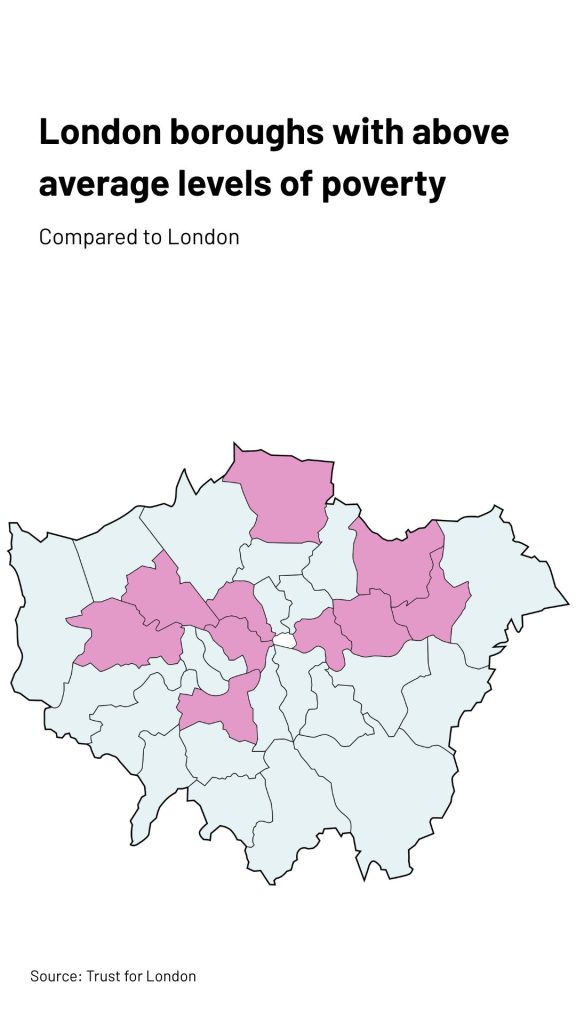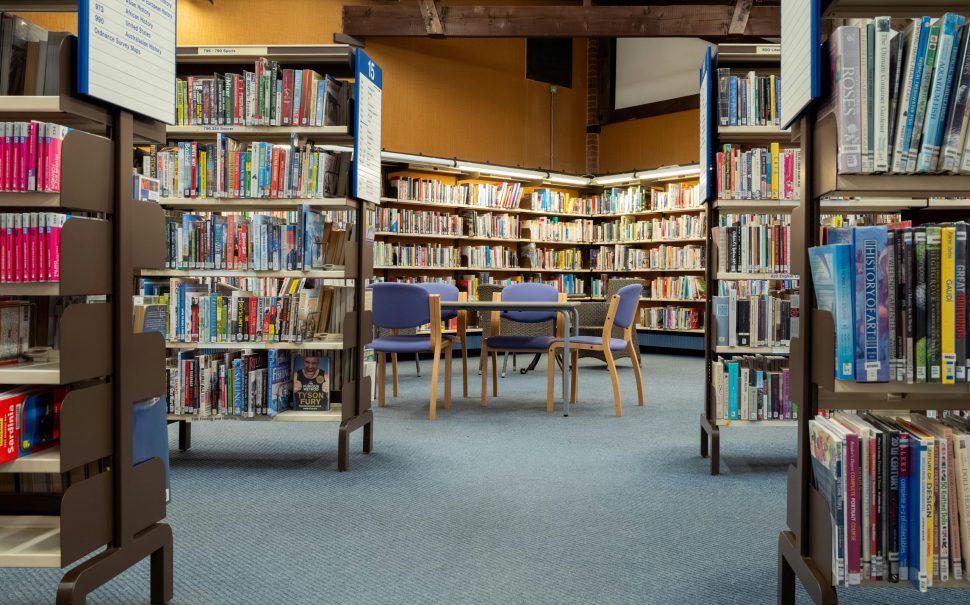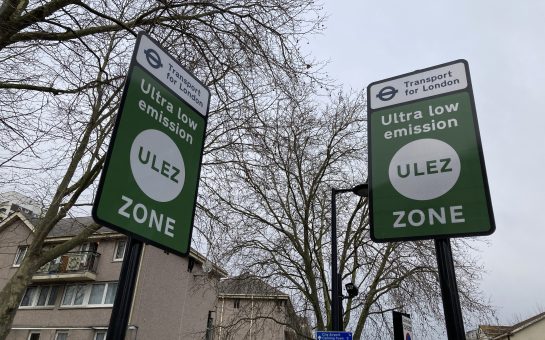Seven libraries in Enfield are closing as findings show most closures in the capital will affect London’s most deprived areas.
Enfield Council is shutting Bullsmoor, Enfield Highway, Enfield Island Village, Bowes Road, Southgate, Winchmore Hill and John Jackson libraries in a bid to save up to £630,000 yearly and generate an estimated £3.25 million through property sales.
Enfield is one of the most deprived boroughs in the capital with one in three children and nearly a third of households living in poverty.
These closures follow broader data trends that show that London’s poorest areas lost almost three-fifths of the libraries that were shut down in the capital since 2016, when permanent closures are mapped to the government’s Indices of Multiple Deprivation (IMD) – a system which ranks areas according to income, employment and other poverty measures.
Marianna Micheal, writer and producer 32 from Enfield, said: “It’s just a massive blow to all our resources that should be free and funded, and all these wonderful things that come from a library.”
As a freelancer in the arts, Micheal uses the libraries for research as well as as a place to work and socialise.
She claimed it is not clear what will happen to the books and resources found in certain libraries.
“Libraries are one of the free places left in the country, where you can get education, you can read, and it can be both a hobby or education, and it’s a warm and safe space,” Micheal added.
Moreover, Enfield’s libraries offer a multitude of services beyond book borrowing and computer use.
John Jackson, one of the libraries set to close, runs a CV workshop, helping people get back into work, and a Childrens’ Sensory Space, a friendly aimed at children aged 5-11 with learning difficulties.
A 78-year-old retired Enfield resident, who did not want to be named, said she feels the closures particularly impact the area bordering Haringey, where she lives.
She said: “The libraries like Bowes and South Gate, if they’re closed, this area has no easy access to a library. I was quite horrified, actually.”
Library usage in Enfield has fallen by over half a million visits since 2010.
Yet, since the pandemic in 2016, attendance has witnessed a positive momentum with an increase year on year.
Almost 190,000 more people went to libraries in 2023 to 2024 compared to the year before.
Over the past 14 years, the seven libraries now set to close accounted for almost one-fifth of all library visits in the borough.
Enfield Council said it is confident that its new library network will serve the commmunity effectively, with more than eight out of 10 residents remaining within a 25-minute walk of a library.
But for the 78-year-old resident, that claim is “a bit outrageous”, especially for people with disabilities or families with small children.
The closures come as part of a new Library Strategy, launched in August 2024.
The original proposal included shutting eight libraries, but following a petition signed by 2,400 residents, Oakwood Library – the most popular of the sites with 43,664 visitors last year – was saved.
With the reduction in services, the council hopes to invest £1.5 million to modernise and make the remaining nine libraries more accessible and sustainable.
Cllr Chinelo Anyanwu, cabinet member for Culture and Inclusion at Enfield Council, said: “The council will retain nine libraries, which will see increased opening hours and improvements, ensuring they remain welcoming and outstanding spaces for all members of the Enfield community.”
But an Enfield campaign group says this will more distinctly affect older people, young, those with disabilities, parents and carers and all those for whom libraries are an essential community lifeline.
Referring to the initial proposals, Enfield Over 50s Forum said: “We consider that the proposal to close eight local libraries is discriminatory in respect of these protected groups because it will have a disproportionately negative effect on them.”
Among the reasons, they highlighted that libraries provide facilities for older children who cannot easily study at home without space or computer access.
The most deprived areas are more affected by library closures
The closures in Enfield are part of a broader pattern across London and the UK. In the past decade, 120 libraries have shut in the capital.
The poorest areas in London were around 15% more likely to lose a library than the wealthiest, according to data acquired by Freedom of Information requests sent to every library authority in the UK and Arts Council England.

Enfield has poverty rates higher than the London average, rising from the 12th to the ninth most deprived borough between 2015 and 2019 in the IMD rankings.
At the same time, spending on its libraries has dropped while Enfield’s population has seen significant increases.
In the last ten years, Enfield has gained over 17,500 more people, while funding for libraries fell by nearly half a million pounds from 2011 to 2021.
Already London’s fourth most populous borough, Enfield Council housing plans are likely to increase the number of residents with 3,500 new homes set to be built across the borough.
With the reduction in libraries and plans to build more housing, Micheal questioned how the reduced network will cope with increased demand.
“We’re having an increase in accommodations being built in the area, so more people and again, where are the resources?” the writer and producer said.
Enfield Council is not alone in cutting library services to fill budget gaps.
Across the UK, net expenditure by local authorities on public libraries has fallen by almost 50% in real terms between 2009-10 and 2022-23, from £1.2 billion to £673 million in 2022-23 prices, according to the latest Annual Library Report.
Meanwhile, some are avoiding closures.
The borough south of Enfield, Haringey aims to save £675,000 by reducing opening hours and moving towards a self-service model with reduced staff presence, saving more than Enfield without closing any libraries.
The nationwide cuts to libraries has prompted warnings from a national library charting institute.
Nick Poole, former chief executive of the Chartered Institute of Library and Information Professionals (CILIP), said: “Let us be under no illusions – the principle of universal access to a free, quality library service supported by professional library staff is under sustained assault in the UK.
“As Local Authorities begin to push back on central Government cuts by challenging the legal definition of ‘minimum service requirements’, we will likely see further challenges to the idea of libraries as a universal entitlement in the months ahead.”
In February, the culture secretary Lisa Nandy announced more than £270 million in funding for arts venues, museums, libraries and the heritage sector to support the services.
Isobel Hunter MBE, chief executive of Libraries Connected, said: “The Libraries Improvement Fund has been transformative in helping library services in England adapt to the changing needs of their users.
“This new round will broaden that legacy, creating more accessible, sustainable and inclusive libraries across the country. We can’t wait to see the successful projects take shape.”
Featured image: Metin Ozer via Unsplash





Join the discussion